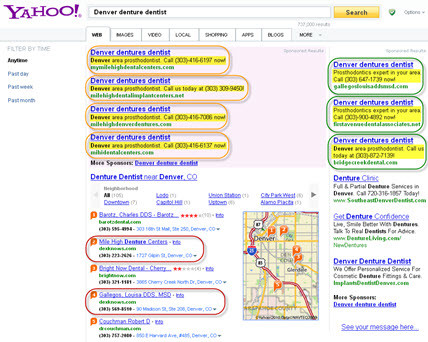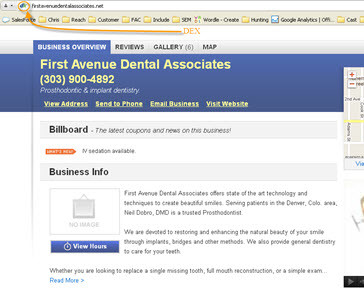I stumbled across a SERP (Search Engine Results Page) today that has taken the last of the air from the Dex sails. Dex One, or dexknows.com has started claiming local listings on the customers behalf and pointing the local, or places (shown in example below in red) listings at the Dex “digital storefront.”
What does this mean? On the surface it seems like a great customer service, but when you start dig into the ramifications of the action in organic placement* , as well as the customer being charged for free traffic****, artificially inflating the traffic to Dexknows.com**, not to mention handcuffing the customer to Dex***.
Let me explain in further detail.
Organic traffic positions on SERPs are based on engine algorithms that use many data points, while the exact formula is a highly guarded secret, we do know most of the ingredients. I am going to explain to you, not in any particular order, some of the way algorithms work. To understand algorithms you need to look at a search engine as a large file cabinet with all items that appear on the page as a file in the cabinet. Every time a search is conducted the files in the cabinet are accesses, searched through and then results are shown based on a number of factors that the algorithm is programmed to look for.
Some of the factors are:
- Relevance to the search string.
- Newness & freshness of information on the site.
- Heading tags (H1’s)
- Page descriptions
- Domain Age & Time to Expiration
- Domain Authority (often called MOZ Rank)
- Social Media grades (Twitter, Blog, Facebook followers)
- Conversion Forms
- Contact Numbers
- Number of pages indexed
- Total Traffic Rank (Alexa Score)
- Keyword Density
- And many other factors
Engines like Google change their Algorithm on a very regular basis, sometimes multiple times a day. When you entire business is driven by your Algorithm, you tend to spend as much time making sure it is the best available. Don’t Believe it? Here is a link to the Google blog talking about algorithm. http://googleblog.blogspot.com/2011/08/another-look-under-hood-of-search.html
With that said, let’s talk about how Dex’s claiming local listings impacts a business’s overall web presence. When a “Local or Places” location is claimed by the business owner, the business gets to input information that tells their potential customers all about their business in an effort to inspire the searcher to contact the business. Dex has claimed listings (in the example below, Red circled areas) for the customer and placed all the data on the “Digital Storefront” (a Dex product) into the “Local or Places” listing on the engine. The issue arises when the phone number is placed into the listing, in place of the customers phone number, they have placed a Dex owned tracking number that routes to the business, and in place of the customers website, they have set the link to the customers “Digital Storefront,” (Another Dex Product) so when clicked the searcher finds themselves at a single info page, hosted on the Dexknows.com domain.
*- Why Call Tracking Numbers Cause Issues In Local Search Results(Reference taken from http://searchengineland.com/for-local-seo-lack-of-call-tracking-solution-spawns-cloaking-70198 )
There are two fundamental reasons why tracking numbers can cause issues with Google Place Search, other local search engines, and organic search marketing over time.
First of all, many local business directories and local search engines use the phone number as a key identifier for individual businesses. A phone number is often an easy ID to use for indexing businesses because they are generally prone to less variation in how they’re presented in databases or on webpages.
When an index database is processing a set of business listings to add to or update their existing listings, if a business’s listing in this fresh dataset does not match with the existing listing already in the database, there is a risk that the algorithm will not be able to associate the new listing information with the existing info in the database. So, any ranking factors associated with that new listing info may not get applied to the business.
PageRank, reviews, citation value, TrustRank, keyword relevancy, etc — all of these possible elements which could help the business in rankings might not get applied to the business’s main listing. That information might disappear into the void, or it might result in the directory spawning a second, duplicate listing for the same business — which can result in splitting of the ranking values across two listings over time instead of laser-focusing all of them upon one business listing.
***-Second, if the business ever changes call tracking solution providers or stops using the tracking numbers, the phone numbers they’ve been using will stop working. Considering the degree of data sharing among local directory companies, if you use the numbers outside of paid search you will almost certainly have them spread out to many other sites which you’re not even aware of. This can result in lost business referrals over time as consumers may call defunct numbers and figure the business is no longer there.
I’ve investigated cases where a company used tracking numbers in one yellow pages site and didn’t realize the numbers had spread to other local sites — utterly ruining their ability to detect how many calls came from which channels and obviating the entire point of using the numbers for non-paid campaigns.
The main issue with fixed call tracking is the potential damage to local search rankings. SEO is sometimes a game of inches where you need to squeeze advantage from a wide variety of ranking signals. Use of a call tracking number may not result in your business dropping all the way out of the rankings in local search, but it could sandbag you, and you might not even be aware of it.
The dividing lines between social media promotion and organic search optimization are becoming blurry as well, and as companies attempt to leverage social media, I’ve no doubt they’ll employ tracking phone numbers there as well. Any place where a citation to your business may appear would be a place to avoid using the tracking numbers — including in Twitter and Facebook.
I’ve had individuals tell me anecdotally that they’ve used tracking numbers “with no problem”, but I can see that their ability to actually assess any potential impact is actually pretty low.
Are you adept enough to tell if you’ve lost 3%, 5%, 10%, 20%, or 30% of your potential local search ranking weight?
Where there are a few hundred variables involved in a constantly changing environment, detecting impacts and isolating causes can require significant sophistication. If you’re in position #1 for top keywords before and after introducing call tracking, you may not have cause for concern.
**- Inflating Dexknows.com total traffic score
Alexa is a website similar to TV’s Nielsen Rankings that looks at total traffic into the Internet property or domain I.E. Dexknows.com. It measures the amount of total site visits each website receives and then assigns the domain a rank. Ranks are much like a golf score, the lower number the more traffic the site has. Google.com has a rank of 1, Facebook.com has a rank of 2, and YouTube has a rank of 3. When your website has more traffic, naturally the prospect of advertising is more appealing to a potential customer.
Dex has artificially inflated the “site traffic” for the dexknows.com domain by sending all paid traffic for their “Guaranteed Actions” customers, as well as the “SP” programs to “Digital Storefronts” on the dexknows.com domain. For example, when you click any one of the circled links in the Example page above, you will travel to the URL (website address) listed below the ad, but the page you see will be in the dexknows domain. This allows Dex to claim overall site traffic for presentation to other clients, when the reality of the nature of the traffic is directed at a client “digital storefront.” The claim that they make is not inaccurate, but can be very misleading.
****-Being Debited for “Guaranteed Actions”
Most customers that are currently involved in a “Guaranteed Actions” programs are being debited for clicks, 1 Point just for the “profile view” and then another 5 points for a call or email. So let’s assume that you were looking for the number to your dentist, and you do a Google search for your dentist name, the places results shows your dentist at the top of the local/places listings (Circled in Red in the example above). You dial the number (5 points), or click the link (1 point) then dial (5 Points) the number.
Every business is entitled to a free appearance on Yahoo, Bing, and Google. Dex has just found a way to charge for something the customer would have received free.
*******************UPDATED December 29th 2011*******************
Since publishing this article on 10/6/2011 it seems as if something has changed. I am no longer able to find Dex track line numbers in local

